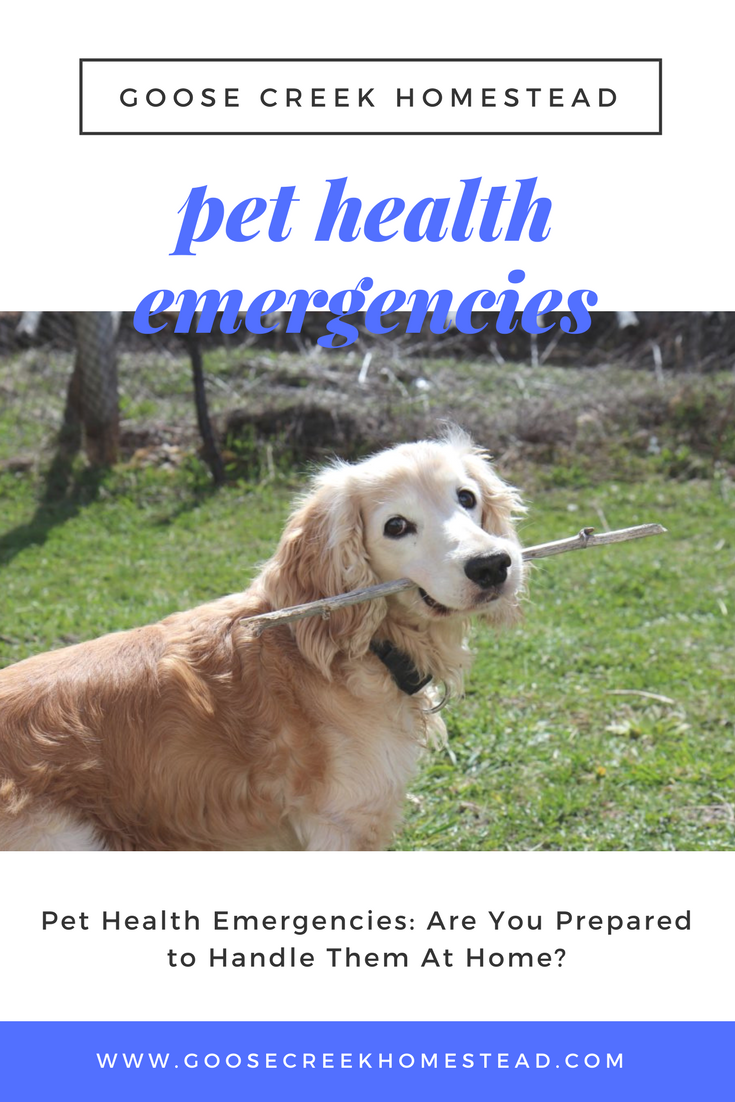Pet health emergencies always seem to occur at the worst possible time! Usually, in the middle of the night, or over the weekend, when your only option is a very expensive trip to the emergency animal hospital. If you live in a very rural area, your only option may be to wait until the vet opens in town. Being prepared with a fully stocked pet first aid kit to handle your pet’s health emergencies at home could save your pet’s life, save you some money, and save your pet some needless pain and suffering!
Pet Health Emergencies: What to keep in your pet’s first aid kit.
First-aid supplies
Chlorhexidine Solution and a plastic squeeze bottle-For cleansing the wound and killing bacteria; especially good for wounds that have become contaminated with something nasty like dirt, urine, or stool
Sterile Saline Wound Flush– For flushing the wound of any hair or debris
Telfa Non-adherent Pads and Self Adherent Bandages– in various sizes to cover the wound once it’s clean and dry
Bandage Tape – I like to put this over the self-adherent bandage to make sure the wound stays covered
Plastic Wrap– for covering open or gaping wounds
Duct Tape and Bubble Wrap– for splinting and immobilizing injured limbs. Bubble wrap can also be wrapped around pets who are in shock to help keep them warm, followed by a Mylar Blanket.
Tweezers, Hemostats, and Small Needle Nose Pliers– for removing splinters and foreign objects(like porcupine quills or thorns)
Rectal Thermometer and Covers and Petroleum Jelly – correct body temperature for dogs and cats is between 99-102 degrees Fahrenheit
Pet Hair Clippers and a #30 Blade-for removing hair from around the wound
An E-Collar-to keep your pet from licking or chewing at a wound, rash, or other irritated areas
A Dog Muzzle or Cat Muzzle that fits your pet- injured animals WILL bite when they are in pain, this is for your safety
A blanket or thick towel- can be used to restrain your pet and keep it warm, or use it as a makeshift stretcher if you must move your pet
A Medicine Dropper-for administering liquid medications; pills can also be crushed and dissolved in a tiny bit of water so they can be administered with a dropper if you are having difficulty giving your pet a pill
Over the counter meds:
Dosages and use of medications will vary according to the type of pet, weight, and age. Make yourself familiar with the correct medications and dosages for your pet BEFORE something happens. The First Aid Companion For Dogs and Cats is an excellent pet first aid manual to keep with your kit. It will help you handle all kinds of pet health emergencies. It has a full listing of dosages for all the medications listed below, as well as advice on what to do in pet health emergencies. I highly recommend reading it before a pet health emergency happens and then keeping it in your kit for reference at all times. Keep a notecard in your first aid kit that states what your pet’s correct body temperature and respiration should be, dosages of all medications in your kit, your vet’s contact info, contact info for the closest backup emergency vet for after hours, and the number for poison control. Not all medications are safe for cats! Please do your own research before administering any of these medications to your pet!
Liquid Diphenydramine-for allergic reactions; can also be used as a mild sedative
Buffered Aspirin– for pain and inflammation(DO NOT GIVE TO CATS!)
Dramamine-for car sickness and nausea
Loperamide(Immodium)– for diarrhea
Stool Softener, Psyllium Fiber and Miralax– for pets having difficulty producing a bowel movement (a common issue for cats because they tend to not drink enough water)
Cortizone Cream-for itching and inflammation, like bug bites, or rashes
Lanacane Cream– for pain and itch; contains an anesthetic to numb the affected area
Antibiotic Ointment – to prevent infection
Lubricating Eye Drops – to treat irritated eyes
Electrolyte Solution – to prevent and treat dehydration
Activated Charcoal – administer if you think your pet has ingested something poisonous.
Read next: Resources for Homesteaders

